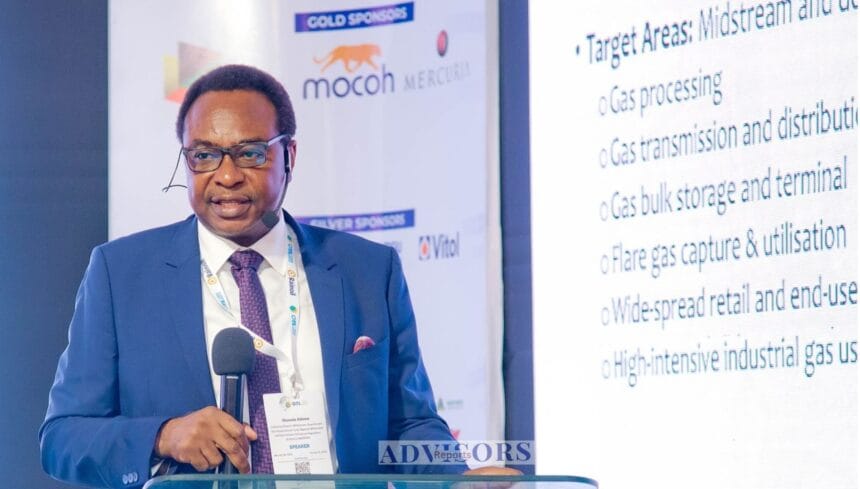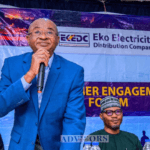… recommends sustained government support
“Nigeria’s gas pipeline network meets just 10% of local demand, urgent investment needed to bridge critical gap”- ED MDGIF, Adama says
Oredola Adeola
The Midstream and Downstream Gas Infrastructure Fund (MDGIF), under the Nigerian Midstream and Downstream Petroleum Regulatory Authority (NMDPRA), has revealed that an integrated approach combining policy support, infrastructure development, and technology investment is needed to unlock Nigeria’s gas potential fully.
Mr. Oluwole Adama, Executive Director of MDGIF, made this known at the OTLAfrica Summit in Lagos on Wednesday, during Session VI of Day 3, themed “New Energy Order: Updates on Gas, CNG, and LPG”.
Executive Director of MDGIF, called for sustained government incentives, including tax and duty waivers, to attract private-sector investment in critical gas infrastructure for Compressed Natural Gas (CNG), Liquefied Petroleum Gas (LPG), and related projects.
Adama underscored the importance of a supportive regulatory framework in ensuring the growth and stability of Nigeria’s gas sector.
“The injection of funds is only a step.
“Consistent policy support and incentives will pave the way for increased private investment, enhancing our domestic gas value chain and promoting Nigeria’s economic growth,” he said.
Adama highlighted Nigeria’s abundant gas reserves, noting the country’s potential as a leader in the global shift toward cleaner fuels.
“Nigeria is sitting on significant gas resources, and in line with the global energy shift, we must position our gas as a key fuel for energy transition,” he stated.
He added that, although the nation has more gas than crude oil, its gas pipeline network currently covers less than 10% of the infrastructure needed to meet demand.
This gap, he emphasized, underscores the urgency for accelerated investment in infrastructure, predicting that gas will remain critical for meeting Nigeria’s energy needs over the next 20 to 30 years.
He urged private stakeholders to take bold steps in advancing gas infrastructure and expanding Nigeria’s gas network to build a sustainable energy future.
Adama outlined MDGIF’s commitment to financing projects focused on Liquefied Natural Gas (LNG), CNG, LPG processing plants, gas transportation and distribution, bulk storage, and terminals, as well as initiatives for capturing gas flares in alignment with the federal government’s net-zero carbon commitment.
He noted that MDGIF’s mission is to support projects that enhance local gas utilization, particularly at the retail level, including the development of mother-and-daughter station networks to reach end users more effectively.
Projects seeking MDGIF funding must align with Nigeria’s National Gas Expansion Program (NGEP) and the nation’s energy security objectives, while also being economically viable, technically sound, and compliant with Sustainable Development Goals (SDGs) and Environmental, Social, and Governance (ESG) standards.
He explained that six project promoters recently selected by MDGIF have been identified to spearhead initiatives aimed at strengthening Nigeria’s domestic gas market and advancing the country’s energy transition goals.
Mr. Adama clarified that the fund’s primary role is to provide financial and strategic support to enable private-sector investment, not to initiate projects directly.
“We focus on promoting and supporting viable projects while leaving the execution to project owners to drive gas production and utilization.
“Our selected project promoters meet our funding criteria, ensuring their initiatives will substantially boost the domestic gas market,” he said.
Adama elaborated on the MDGIF’s investment will be bolstered by a 1.5% levy on wholesale petroleum product prices, generating income from MDGIF’s equity investments and penalties collected from gas flaring across oil fields.
“Our objective is to accelerate gas use across the country by alleviating the burden on investors from high commercial bank interest rates.
“We are also actively seeking multilateral and bilateral funding sources to advance gas infrastructure development. Our corporate governance framework is a key factor in attracting both foreign and local partnerships,” he said.
Adama explained that the MDGIF has received widespread commendation for its efforts to enhance Nigeria’s gas infrastructure.
He emphasised that the fund’s processes prioritize transparency, employing top consultants for due diligence to ensure effective disbursement of funds.
The ED MDGIF said, “Among the key projects funded by the recent disbursement is a 5,000 MT butane storage facility, expected to support 13,200 MT of Nigerian Liquefied Natural Gas (NLNG) production and slated for completion by year-end.
“Another major project aims to establish 20 mobile CNG refueling stations, a critical step toward reducing Nigeria’s dependency on traditional fuels as more partners convert their vehicles to Compressed Natural Gas (CNG).
“The MDGIF’s support for these projects signals a commitment to accelerating infrastructure development and optimizing Nigeria’s substantial gas resources,” Adama said.




